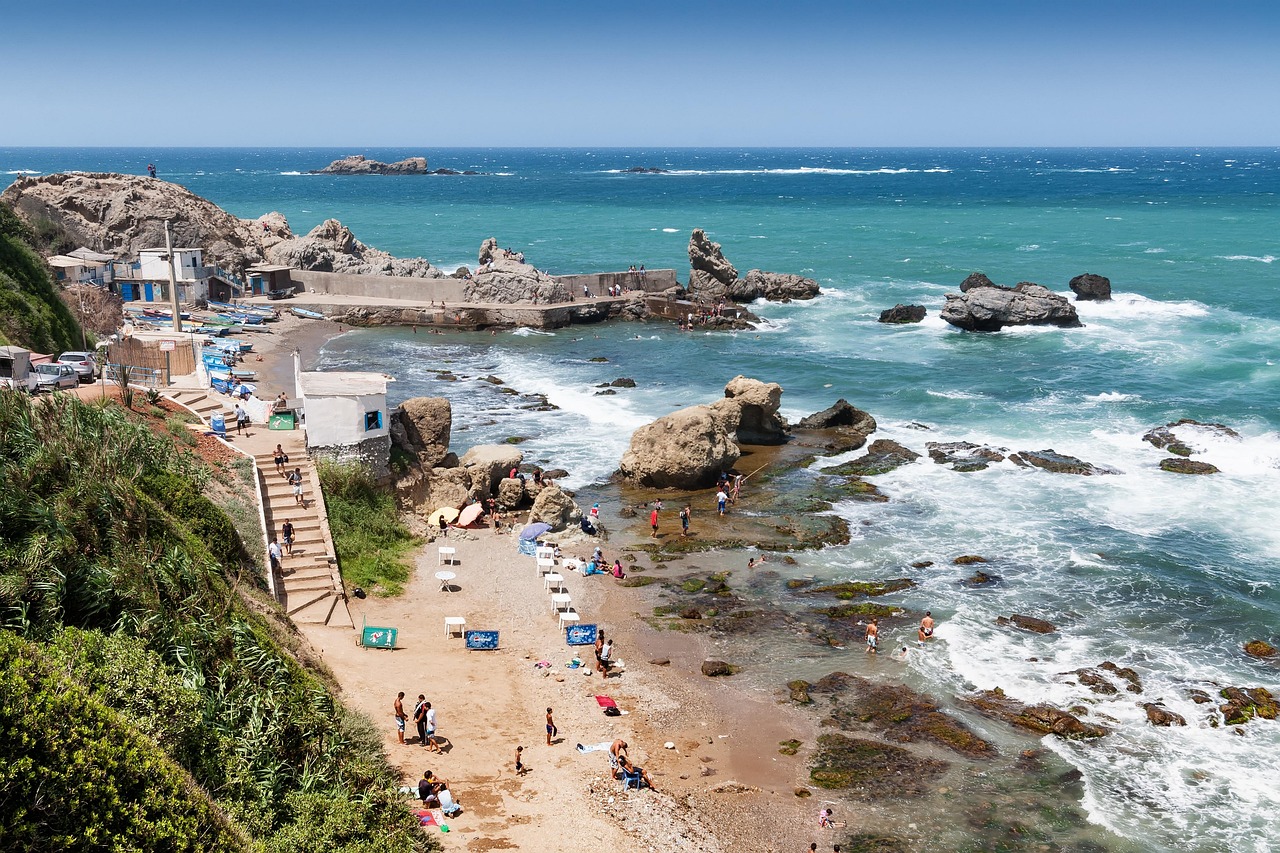When you go to beaches or swimming pools in Algeria, you will see lifeguards on duty ensuring the safety of visitors. Their primary responsibility is to prevent accidents and provide quick responses during emergencies, which requires specialized training. Lifeguard training in Algeria addresses this need by preparing individuals to safeguard swimmers at beaches, lakes, waterparks, and pools.
Algeria has a Mediterranean coastline that stretches over 1,600 kilometers, along with rivers, lakes, and numerous public pools. Swimming is a popular activity across the country whether in coastal waters, hotel pools, or recreational centers. With this wide range of aquatic facilities, the demand for lifeguards is strong, especially in the summer months when beaches and pools are most active.
In Algeria, lifeguards serve at beaches, pools, lakes, and waterparks to protect swimmers. With so many aquatic facilities, there are many opportunities for those interested in lifeguarding.
Training in Algeria is the first step to starting a career in this field. After receiving certification from a recognized organization such as the American Lifeguard Association (ALA), candidates are ready to work at beaches, pools, and aquatic venues.
ALA training centers in Algeria provide a variety of lifeguard programs and certifications. While most training happens in summer, opportunities for work and training continue year-round through indoor pools and aquatic facilities.
With more than 30 years of experience, ALA has certified lifeguards who now serve communities around the world. An ALA certificate is respected by employers and shows professionalism in aquatic safety.
The American Lifeguard Association (ALA) is supported by Global Lifeguards and the Swimming Pool and Spa Foundation, two nonprofit organizations focused on drowning prevention and aquatic safety.
ALA’s mission is to improve the safety of pools, beaches, and waterways. To achieve this, it works closely with employers throughout Algeria and internationally to train lifeguards and establish strong safety practices.
Over the years, ALA has been referenced by leading health and safety organizations, including:
Training reflects updated ECC science and includes standards from the Lifeguard Training Standards Coalition Report. In addition, ALA requires that employers follow the Model Aquatic Health Code (MAHC) for pre-service evaluations and in-service training.
To register for the ALA lifeguard training program in Algeria, applicants must meet the following requirements:
Candidates must also demonstrate these skills:
After completing the course, participants receive an ALA Lifeguard Certificate, which also includes CPR/AED for the Professional Rescuer and First Aid. This certification is valid for two years.
Although lifeguarding is often seen as a summer job for students, in Algeria it can grow into a professional career. Employment opportunities exist throughout the year at indoor pools, fitness centers, and resorts. With additional training, lifeguards can move into higher positions such as:
These advanced roles offer better pay, leadership experience, and long-term career opportunities.

Lifeguarding Course Participants at the American Lifeguard Association will learn:
Would you like to read about: Lifeguard Training in Mauritania
Algiers Province
Tipaza Province
Oran Province
Bejaia Province
Annaba Province
The main goal of lifeguard training in Algeria is to prepare individuals to protect swimmers and prevent accidents. Lifeguards supervise their zones from chairs, patrol open water areas, and use binoculars and rescue tools when needed.
The American Lifeguard Association is recognized as one of the leading providers of aquatic safety training. With over 30 years of experience, ALA delivers lifeguard training in Algeria with high standards, ethics, and professionalism.
If you are looking for “lifeguard training near me” in Algeria, the American Lifeguard Association is the right choice. For more information on certification and training programs, please contact ALA.
Here are some frequently asked questions about the Lifeguard Training program you can find more on our FAQ page if you don’t feel free to send us your questions on our contact us page
Most lifeguards work barefoot or in special water socks for safety and mobility. Regular shoes are not suitable around pools or beaches, but some facilities may allow lightweight water shoes if needed.
The main risks include sun exposure, dehydration, physical strain from rescues, and emotional stress from emergency situations. However, with proper training, protective gear, and regular breaks, these risks can be minimized.
Lifeguard training in Algeria is essential because the country has a long Mediterranean coastline and a growing number of pools and waterparks that attract thousands of swimmers every year. Proper training ensures that lifeguards are prepared to prevent accidents, respond to emergencies, and create a safe environment for both locals and tourists.
The swim test usually includes:
Swimming 300 yards continuously using front crawl and breaststroke
Surface dive 7–10 feet to retrieve a 10-pound object
Swimming 20 yards carrying the object
Exiting the pool without a ladder, all within 1 minute and 40 seconds
To become a qualified lifeguard in Algeria, you must enroll in a certified training program, such as those offered by the American Lifeguard Association (ALA). The course includes swimming assessments, rescue techniques, CPR/AED, and first aid training. After completing the course and passing both the practical and written exams, you receive a lifeguard certification valid for two years.
A standard lifeguard course typically lasts 25 to 30 hours, spread across several days. This includes classroom instruction, in-water training, and final testing. The exact length may vary depending on the training center and schedule format (intensive or spread out).
In Algeria, you must be at least 15 years old to work at a pool, waterpark, or lake, and 16 years old to work at beaches or open-water facilities.
During lifeguard training, you should wear a proper swimsuit (one-piece for women, trunks/jammers for men) and bring a towel, goggles, and dry clothes. Some training sessions may also require a whistle and athletic wear for classroom instruction.
The American Lifeguard Association has been approved for the Capital One Affiliate Program! for Tuition Assistance Loan
To stay updated with our special offers, subscribe to our weekly newsletter. We will not share your information with any third party.
8300 Boone Blvd 5th Floor Vienna, VA 22182
703-761-6750
Media Contact
703-856-8901
alalifeguard@aol.com